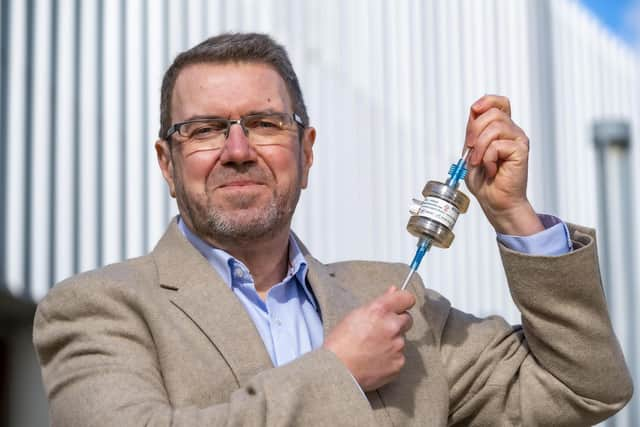Edinburgh firm pioneering liquid biopsy tech welcomes seven-figure funding injection
BioCaptiva says the cash injection will be used to fund it through the first in human trials with the BioCaptis – which it describes as a “revolutionary” cell-free DNA (cfDNA) capture device – to generate its first data before the end of 2022, and to prepare for regulatory trials set to start in 2023.
The business said BioCaptis can capture up to 100 times more cfDNA than a conventional blood draw, and this consequently “increases the types and stages of cancers amenable to liquid biopsy testing thereby greatly expanding the number of patients who could benefit from this approach to cancer-management”.
Advertisement
Hide AdAdvertisement
Hide AdThe latest funding round marks further investment in the firm by Archangels, which has backed many early-stage Scottish life sciences and technology companies, and says it now comprises around 120 investor members and leads investment of around £20m per year in young firms.
BioCaptiva last year secured more than £1m in seed funding from the business angel investment syndicate and Scottish Enterprise to progress its technology.
Archangels was this time round joined again by Scottish Enterprise and Cancer Research Horizon, the new innovation engine of Cancer Research UK, and new investor Old College Capital, the University of Edinburgh’s in-house venture investment fund.
BioCaptiva chief executive Jeremy Wheeler said: “We are pleased to have raised these additional funds as the company enters its next stage of development, with the BioCaptis beginning its first in human trials.


"These trials will allow us to generate important data before the end of 2022. This will be a key step before starting regulatory trials in 2023 as we move towards our goal of unleashing the full potential of liquid biopsy in cancer-management to improve patient outcomes.”
Sarah Hardy, director and head of new investments at Archangels, stated: “In 2021, Archangels supported the spin-out of BioCaptiva from the University of Edinburgh based on the technology developed from Professor Tim Aitman and Professor Mark Bradley’s research.
Potential
"Since then, the company has made remarkable progress... We are pleased to lead this financing to support the company in generating its first in human data, and towards its ambition of ensuring that the BioCaptis device can play a key role in realising the full potential of liquid biopsy testing for cancer-management.”
Alco commenting was Andrea Young, fund manager at Old College Capital, who stated: “[BioCaptiva’s] technology is the result of collaborative research by two world-leading University of Edinburgh academics, and its goals are perfectly aligned to the Old College Capital mandate. We look forward to working with BioCaptiva and a strong syndicate of investors led by Archangels to make the BioCaptis device a success."
Advertisement
Hide AdAdvertisement
Hide AdFurthermore, BioCaptiva is an “innovative and exciting” company with great potential, according to Kerry Sharp, director of entrepreneurship and investment at Scottish Enterprise.
She stated: “Its BioCaptis device has the potential to really transform the way cancer is diagnosed, monitored and managed. We look forward to seeing how its first in human trials progress, followed by regulatory trials, so that one day soon this exciting new technology can be put to work for the benefit of patients.”
Comments
Want to join the conversation? Please or to comment on this article.
